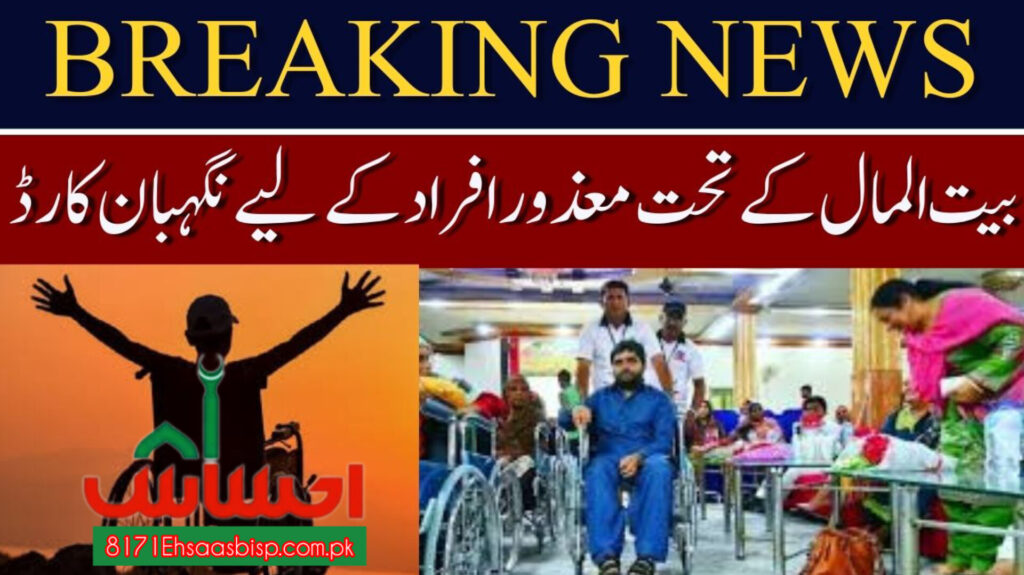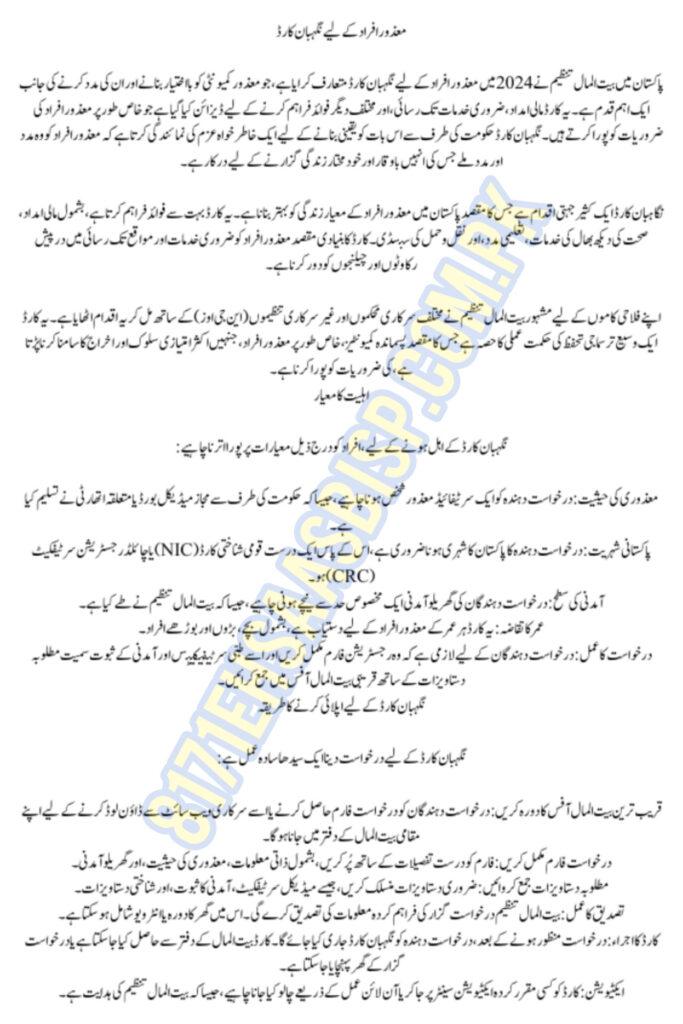
Negahban Card for Disabled Persons: August 11, 2024
The Bait-ul-Mal organization in Pakistan has launched the Negahban Card for Disabled Persons in 2024, marking a crucial milestone in the nation’s efforts to support and empower the disabled community. This initiative is designed to offer comprehensive financial aid, access to essential services, and a range of benefits tailored to the unique needs of disabled individuals. The introduction of the Negahban Card underscores the government’s commitment to enhancing the quality of life for disabled persons, ensuring they receive the necessary support to live with dignity and independence.
Negahban Card: A Multi-Faceted Initiative for Disabled Persons
The Negahban Card is an all-encompassing initiative aimed at significantly improving the lives of disabled individuals in Pakistan. It offers various benefits, including financial support, healthcare services, educational assistance, and transportation subsidies. The primary goal of this card is to eliminate the obstacles that disabled persons often face when trying to access essential services and opportunities.
This initiative, spearheaded by the Bait-ul-Mal organization—an entity renowned for its charitable work—has been developed in collaboration with multiple government departments and non-governmental organizations (NGOs). The Negahban Card is part of a broader social protection strategy focused on addressing the challenges faced by marginalized communities, especially those with disabilities, who are often subject to discrimination and exclusion.
Key Benefits of the Negahban Card
- Financial Support: The Negahban Card provides monthly financial aid to disabled persons, assisting them in meeting their basic needs. The amount of assistance is determined by the level of disability and other factors as assessed by the Bait-ul-Mal organization.
- Healthcare Services: Cardholders are entitled to either free or subsidized healthcare services at government hospitals and selected private healthcare facilities. This benefit includes access to specialized treatments, surgeries, and necessary medications.
- Educational Assistance: The card offers scholarships and educational grants to disabled students, ensuring their access to quality education. It also covers the cost of assistive devices and learning tools, removing barriers to educational achievement.
- Transportation Subsidies: Disabled persons holding a Negahban Card can benefit from transportation subsidies, including free or reduced fares on public transport. This assistance facilitates their travel for work, education, and medical appointments.
- Employment Opportunities: Bait-ul-Mal is actively collaborating with various employers to create job opportunities for disabled persons. Cardholders are given priority in job placement programs and are also provided with vocational training to improve their employability.
- Housing Assistance: The Negahban Card offers housing support, including financial aid for home modifications to make living spaces accessible for disabled individuals.
- Legal Aid: Recognizing the legal challenges faced by disabled persons, the Negahban Card also provides access to free legal aid services to help navigate these issues.
- Social Integration Programs: The card facilitates participation in social integration programs that promote the inclusion of disabled persons in community activities, events, and social networks.

- See Also—-}
- Breaking News: How to Apply for the Agriculture Internship Program: A Detailed Guide 2024
- Exclusive Updates: Punjab Government Announces Major Recruitment Drive for 30,000 Teachers 2024
- Breaking News: Sindh Textbook Board Launches Ambitious Tablet Distribution Initiative for Students 2024
- ASF Jobs Apply Before August 25, 2024 – Complete Guide
- Exclusive News: Huawei Train the Trainer Program: A Groundbreaking Initiative for Pakistani Students in 2024
Eligibility Criteria for the Negahban Card
To qualify for the Negahban Card, applicants must meet the following criteria:
- Disability Status: The applicant must be certified as disabled by a government-authorized medical board or relevant authority.
- Pakistani Citizenship: The applicant must be a Pakistani citizen with a valid National Identity Card (NIC) or Child Registration Certificate (CRC).
- Income Level: The household income of the applicant must be below a specific threshold, as determined by Bait-ul-Mal.
- Age Requirement: The card is available to disabled persons of all ages, from children to the elderly.
How to Apply for the Negahban Card
Applying for the Negahban Card is a straightforward process:
- Visit the Nearest Bait-ul-Mal Office: Applicants should visit their local Bait-ul-Mal office to obtain the application form or download it from the official website.
- Complete the Application Form: The form must be filled out with accurate personal details, including information about the applicant’s disability and household income.
- Submit Required Documents: Attach all necessary documents, such as medical certificates, income proof, and identification documents, to the application form.
- Verification Process: Bait-ul-Mal will verify the information provided, which may include a home visit or interview.
- Card Issuance: Upon approval, the Negahban Card will be issued. It can be collected from the Bait-ul-Mal office or delivered to the applicant’s residence.
- Activation: The card needs to be activated either by visiting a designated activation center or through an online process, as instructed by Bait-ul-Mal.
Final Thoughts
The Negahban Card for Disabled Persons under Bait-ul-Mal 2024 is a pioneering initiative that highlights the government’s dedication to supporting disabled individuals. By providing financial assistance, healthcare, education, and other vital services, the card plays a crucial role in helping disabled persons lead more autonomous and fulfilling lives. This initiative not only addresses the immediate needs of disabled persons but also fosters their long-term social and economic inclusion. The Negahban Card is a beacon of hope for many, symbolizing a significant stride towards a more inclusive and equitable society.
